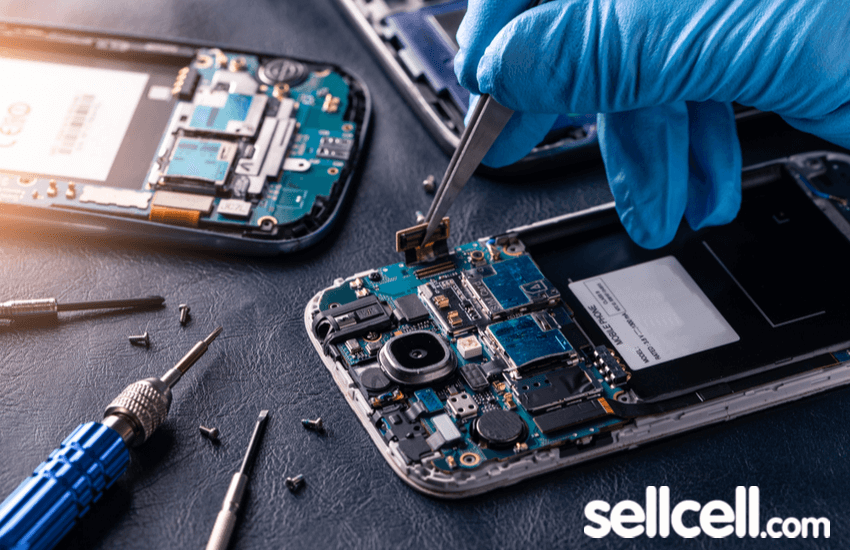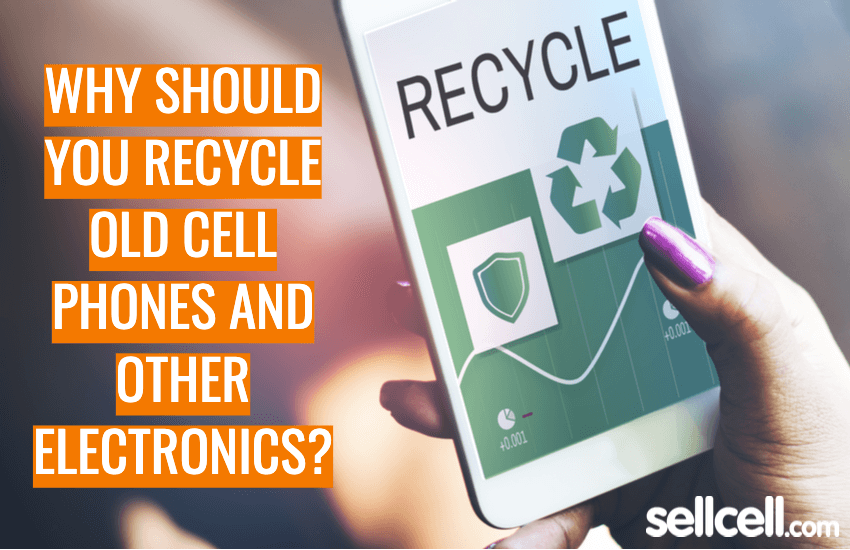Last updated May 11, 2021
We live in an increasingly high-tech world. The downside is an ever-increasing amount of literally toxic electronic waste, also called e-waste. Somewhere between 40 and 50 million tons of electronic waste are thrown out every year, and the amount of e-waste is expected to multiply over the coming years. Yet much of this material can be recycled. Let’s take a deeper look at why we should all be committed to recycling old smartphones and electronics.
Electronics Recycling Prevents Hazardous Materials from Entering the Environment
Did you know that your cell phone contains a number of hazardous materials? Electronic waste or e-waste is only 2% of the waste generated in the United States but accounts for roughly 70% of the toxic waste we produce. For example, the lead solder used to assemble the printed circuit board isn’t a threat to your health when you’re using the phone, but it can leach into the soil if it is thrown into the landfill.
Furthermore, cell phones contain toxic materials such as arsenic, cadmium and brominated flame retardants. Recycling your cell phone ensures that the toxic materials in the phone are either recycled or properly disposed of. And up to 95% of the cell phone can be recycled or reused in some way. Unfortunately, most smart phones aren’t recycled. Around 125 million smart phones are discarded every year, and less than 20% of them are recycled.
Electronics Recycling Means Less Mining
If we recycle metals instead of mining them, they don’t have to build new mines to get the materials. And the metals that are recycled like tantalum and copper are typically processed at existing facilities, so there is no new infrastructure required to recycle your old cell phone. In the case of tantalum, the primary source comes from hand-dug mines in the Congo. It has become an alternative to blood diamonds, though the process of mining and exporting it is little better for the workers. Given these working conditions, we can be certain they aren’t preventing toxic run-off from the mines from entering the watershed.
On the other hand, recycled phones that have been repaired and refurbished meet the growing demand for smartphones without having to extract and process the resources necessary to make a new one. Phones recycled through organizations like SellCell.com often change hands four and five times, extending its life a whopping nine years.

Tech Recycling Conserves Labor
A surprising amount of your cell phone could be reused as is. The sensors, screen, and jacks might be salvageable even if the rest of the phone is junk. This is why parts from a recycled cell phone might be recycled and end up as spare parts for someone else’s phone, even if the battery is dead. If the screen and circuit board are beyond redemption, the battery may still be good. Depending on the procedures of the electronics manufacturer, they may test the battery to see if it is good and can be resold as a spare for someone else or used as is in a compatible cell phone. In fact, this is why you may be offered money to trade in your old iPhone or smartphone. That’s aside from the inherent value of recycling the rare earth minerals in the battery that are literally hard to find. And it is why you should sell phone hardware to a recycler rather than junking it. Note that they’ll take the phone whether it is working or not, since they could repurpose many of the components though a key one is not functional. For example, they can reuse the screen or audio jack even if the battery is dead. Or the battery may find a new home though the screen is beyond repair. The re-use of these components saves materials and manufacturing labor.
Electronics Recycling Conserves Energy
Recycling electronics uses less energy than manufacturing new devices from raw materials. One study found that recycling the 100 million cell phones that are sent to the landfill each year would save enough energy to power almost 400,000 phones each year.
E-Waste Recycling Reduces Abusive Labor Practices
Most electronics recycled in the West are disassembled in factory conditions by laborers paid a minimum wage or better. Compare this to the child labor documented in countries mining the lithium and other rare earth minerals. It is especially bad in the Congo where the cobalt is mined to get the tantalum that ends up in your fast-charging cell phone battery. This is one of the reasons why cell phone recycling is a moral imperative over throwing it out and buying a new one.
It Can Literally Pay Off
Trading-in your old phone for recycling is a viable way of reducing the environmental impact of your new phone. However, there are many companies that want the materials contained within your smartphone. They can make use of the gold connectors, copper wire and tantalum capacitors inside of the phone. This is why manufacturers will pay you for your old device, working or not, regardless of whether they can refurbish and resell the phone or break it down into spare parts for their technicians. All you have to do is drop it off for recycling. A side benefit of this approach is that you may get paid for recycling your old smartphone, helping to pay for your new device.
Summary
Recycling phones is essential to ensuring that we are all playing our part in reducing the ever-growing amount of electronic waste being generated. And it can literally pay off, since you will probably be paid by recyclers for the value of the phone, whether it is working or not. Then you can use those funds toward the cost of a new phone.
References
https://www.sellcell.com/cell-phone-recycling/
